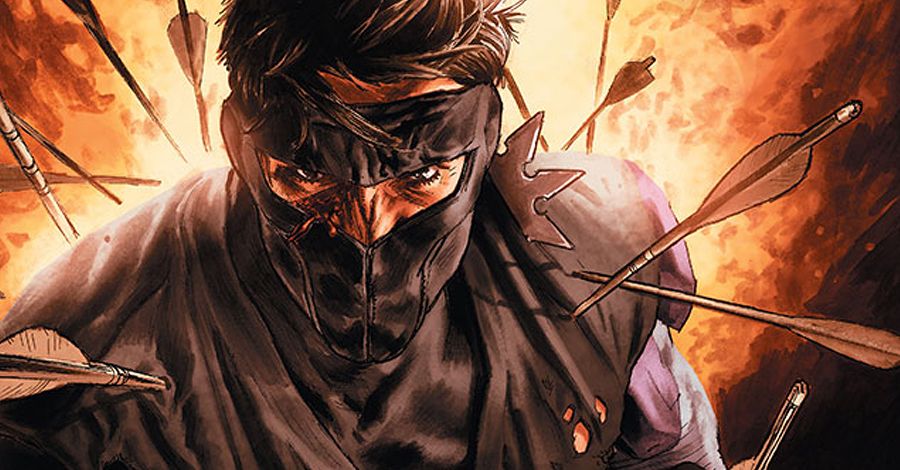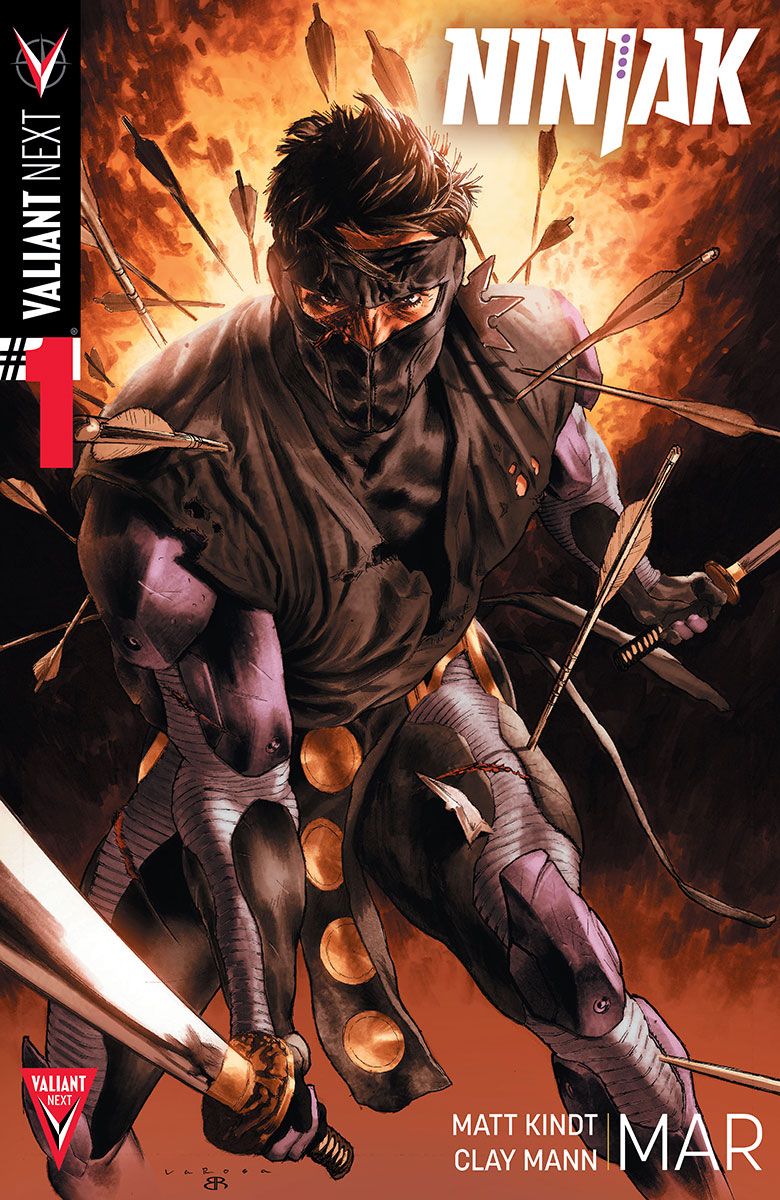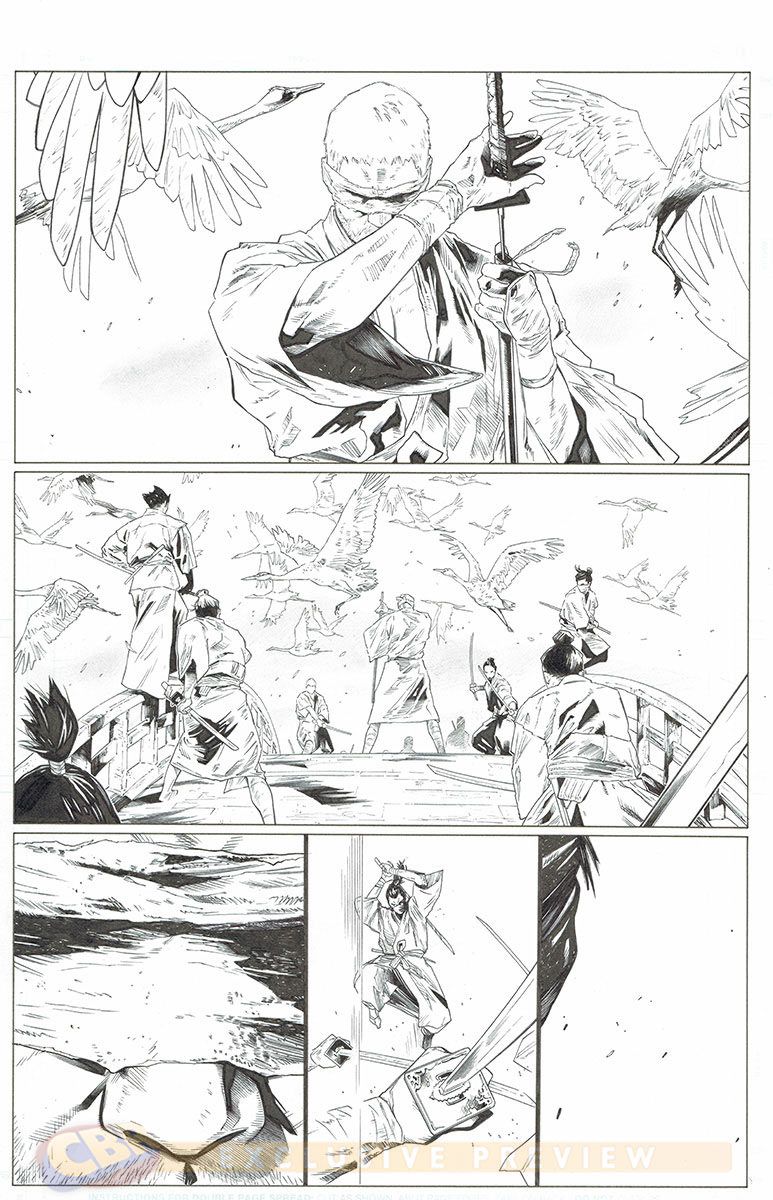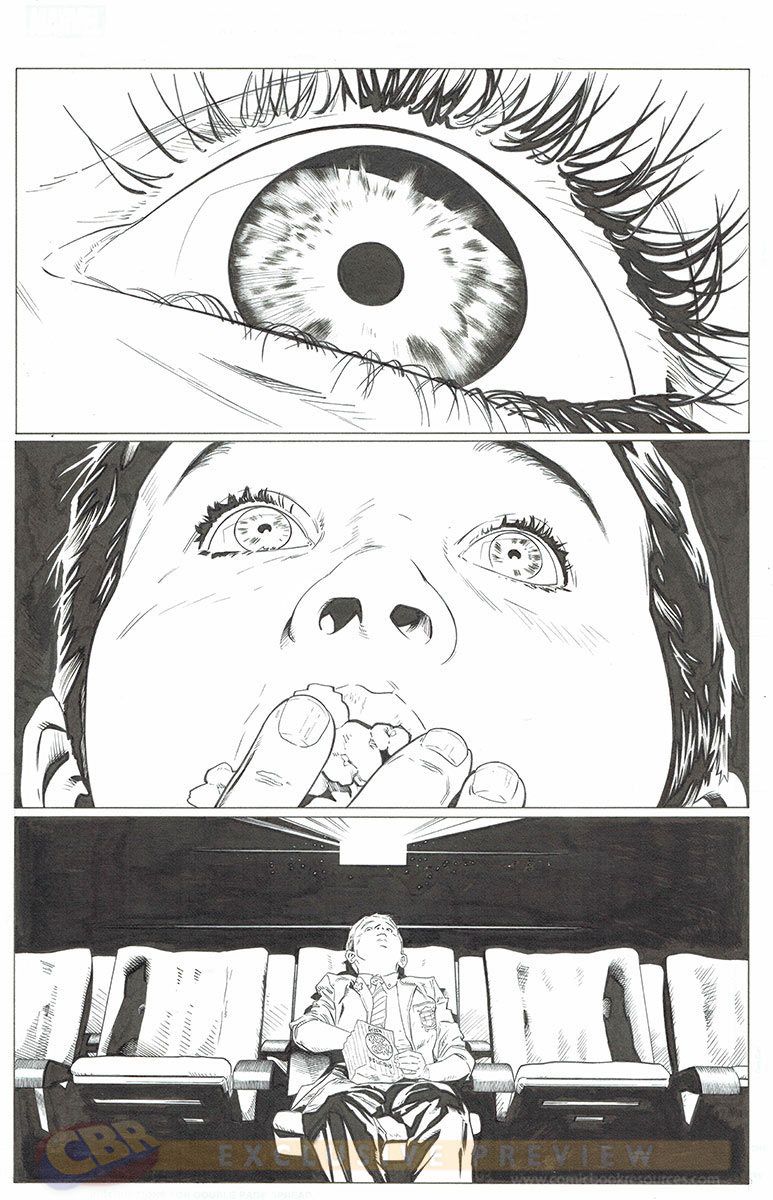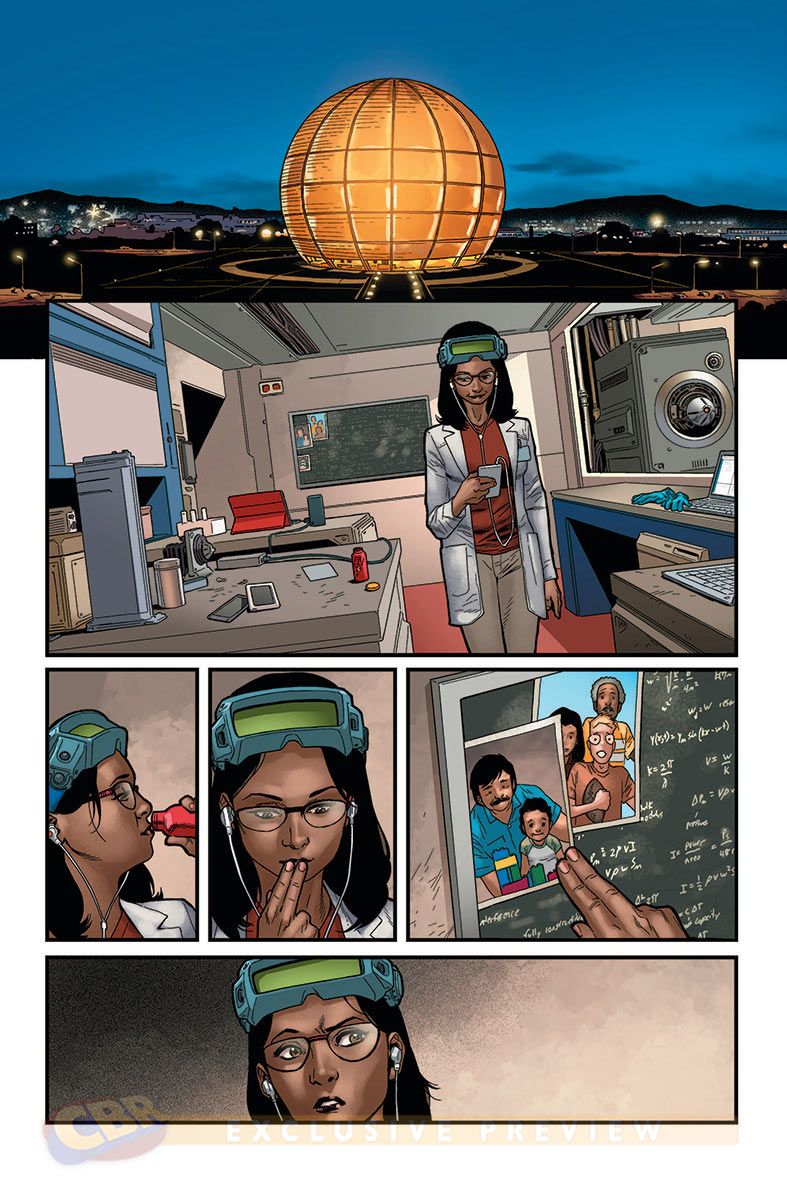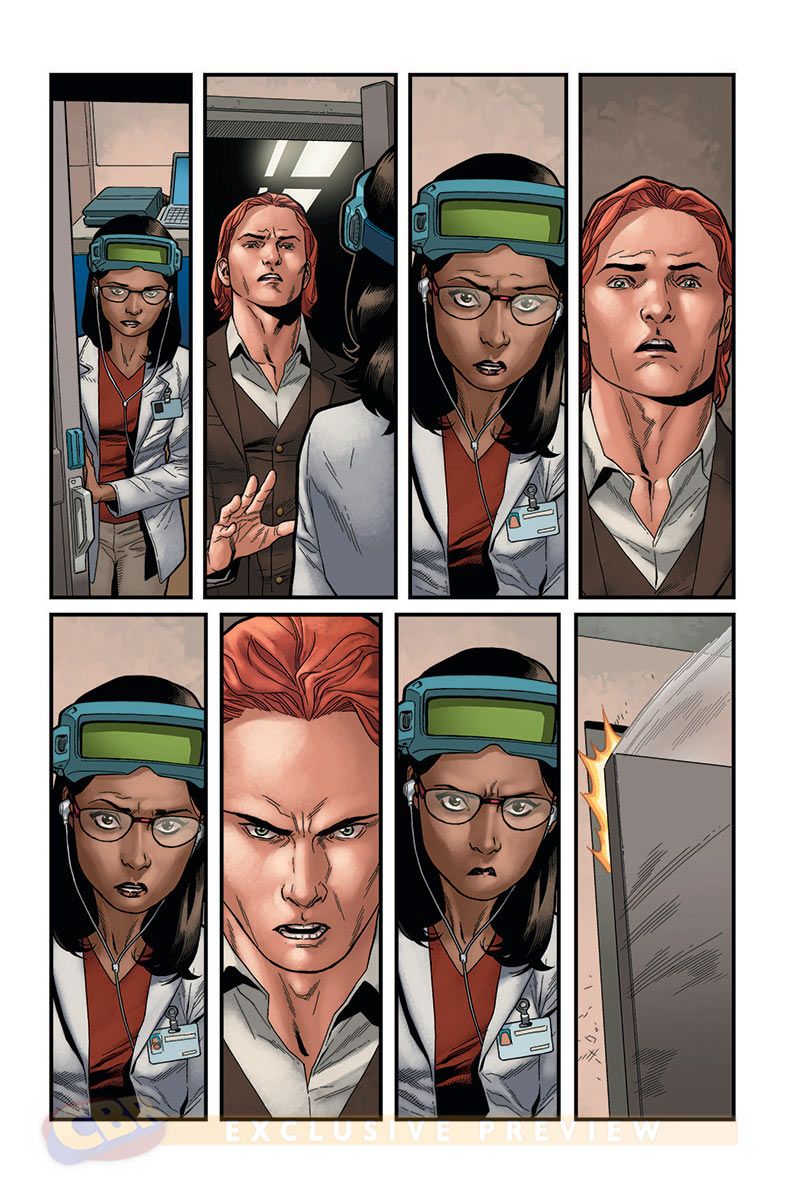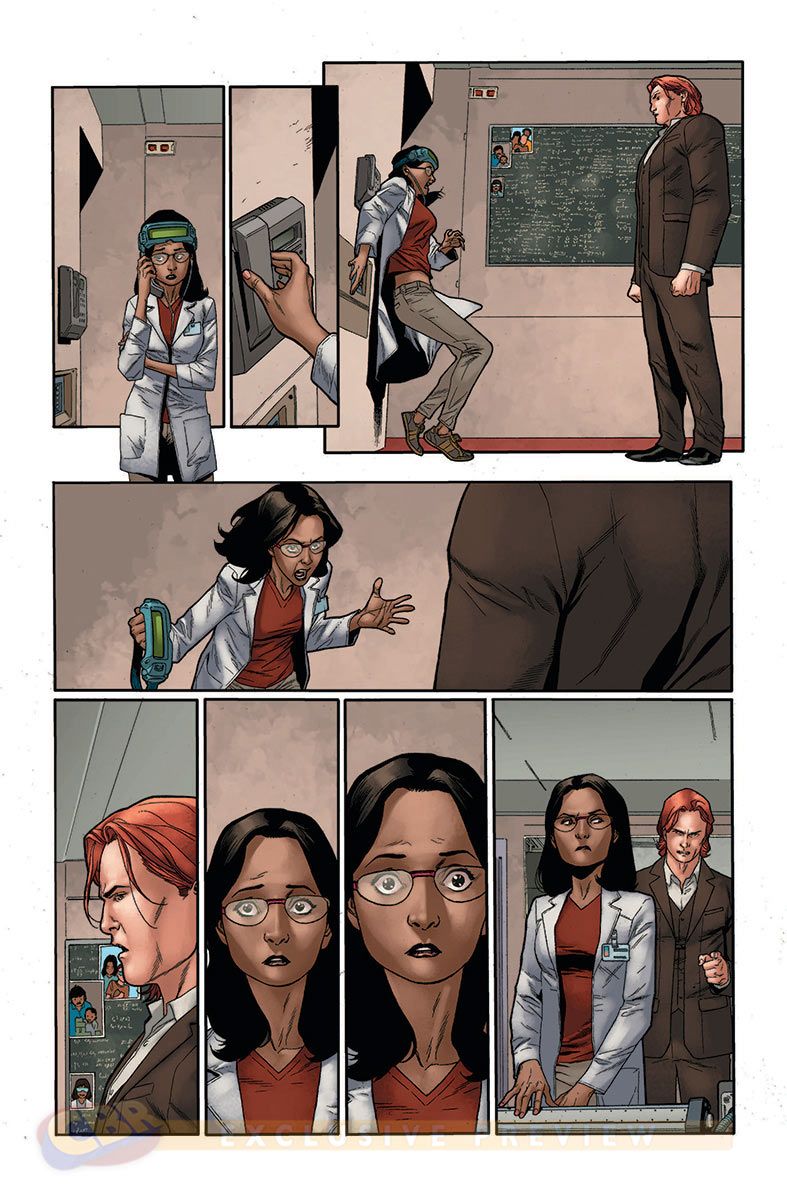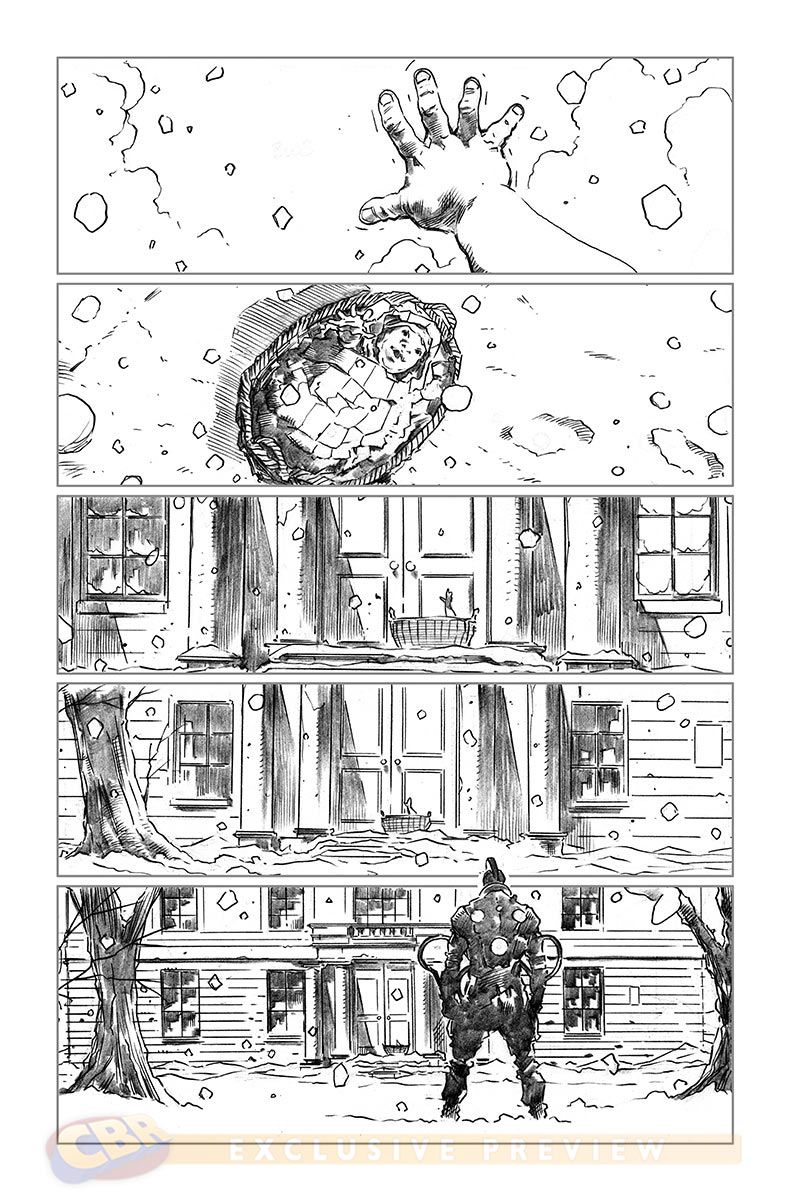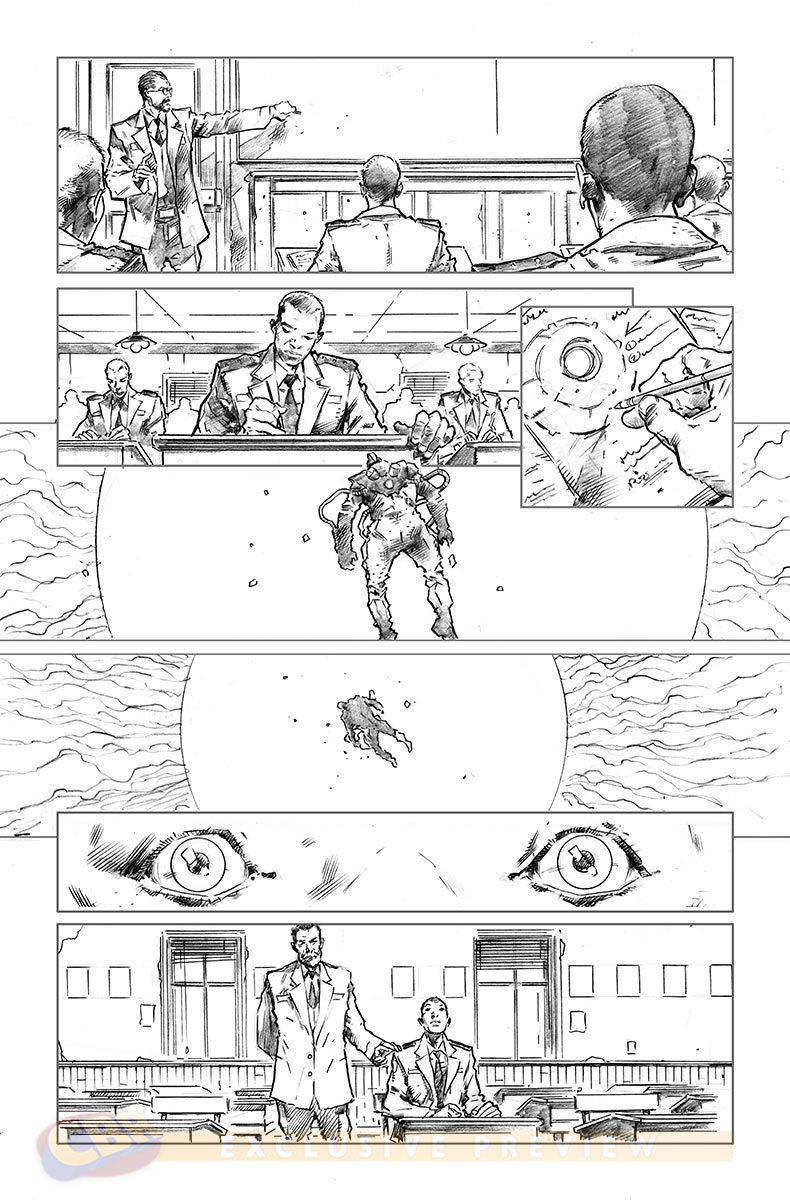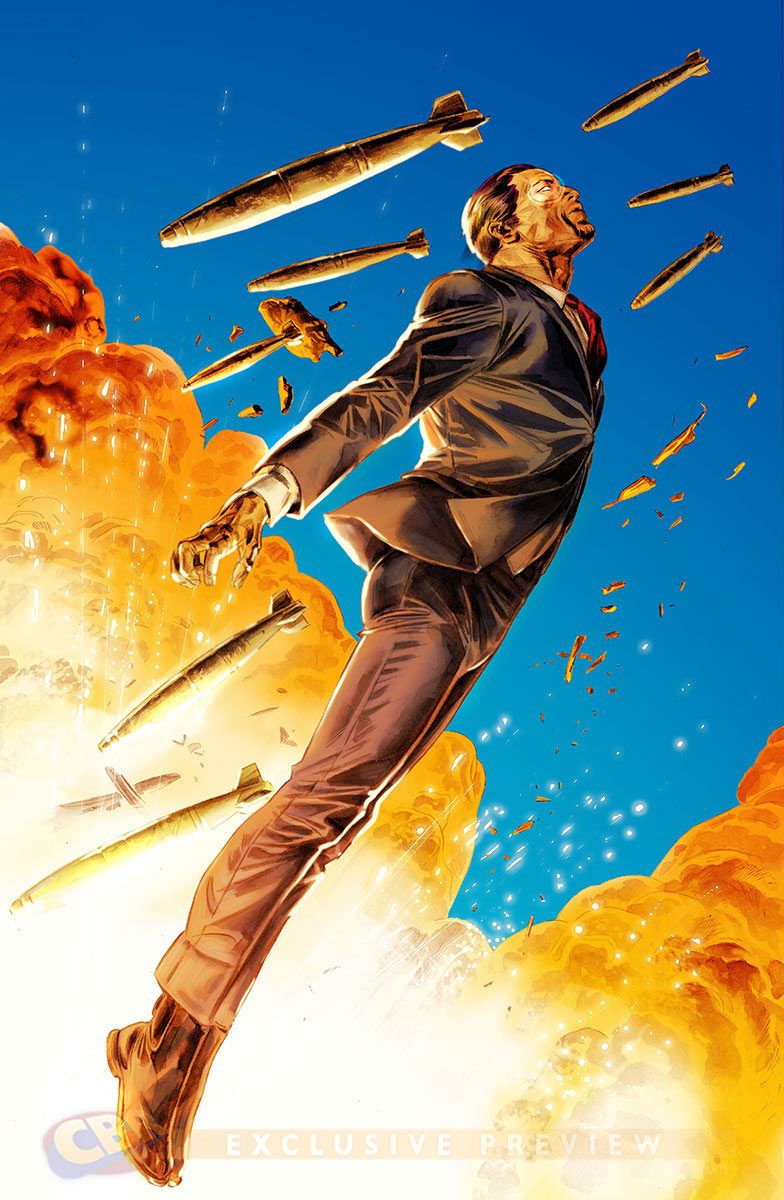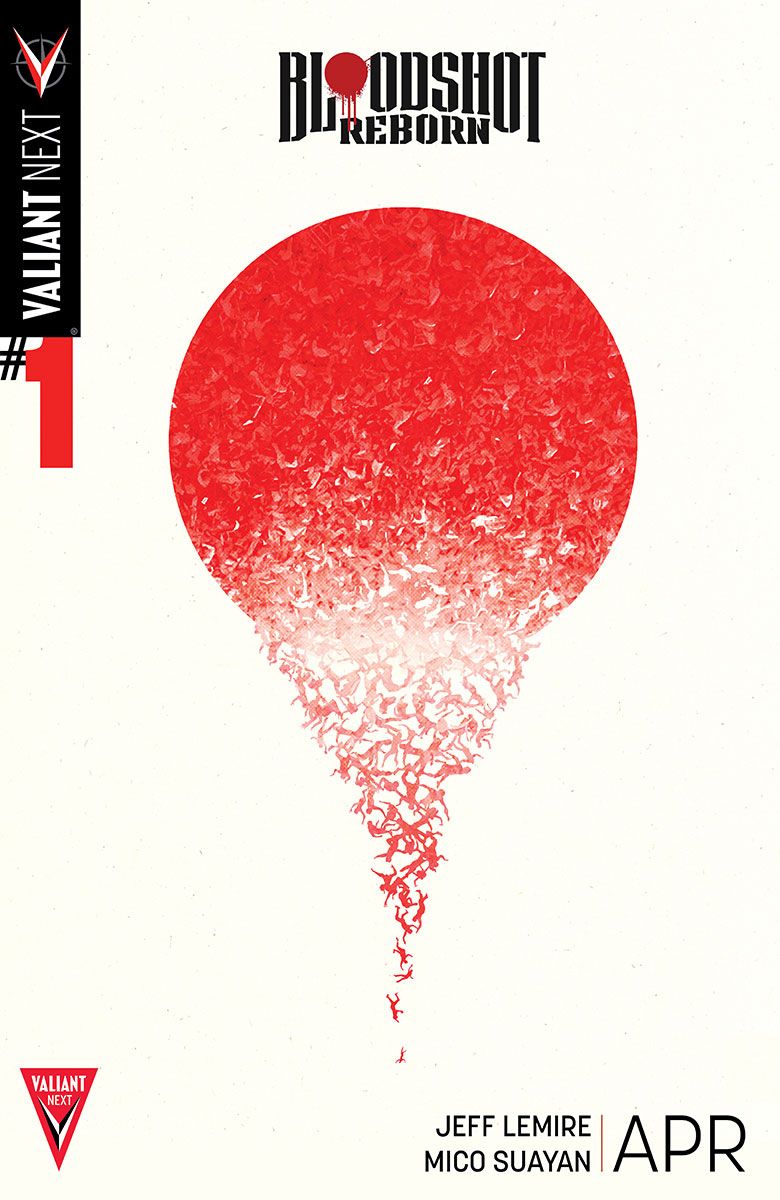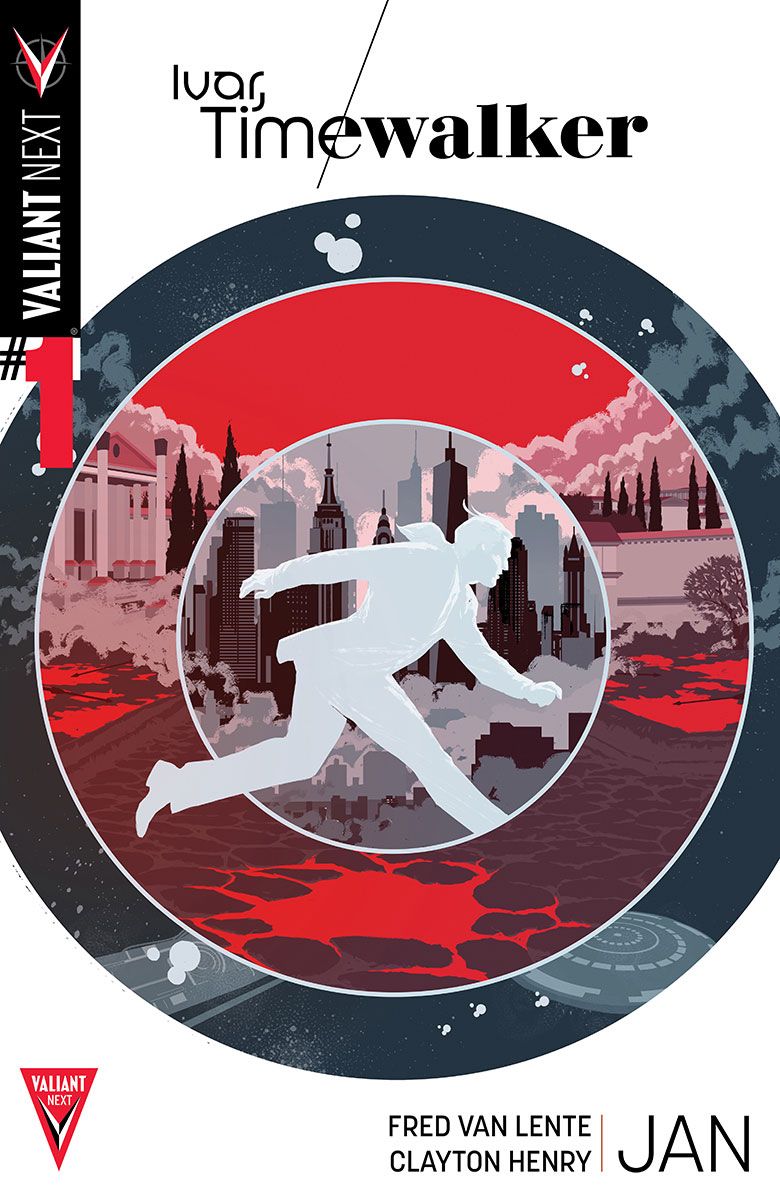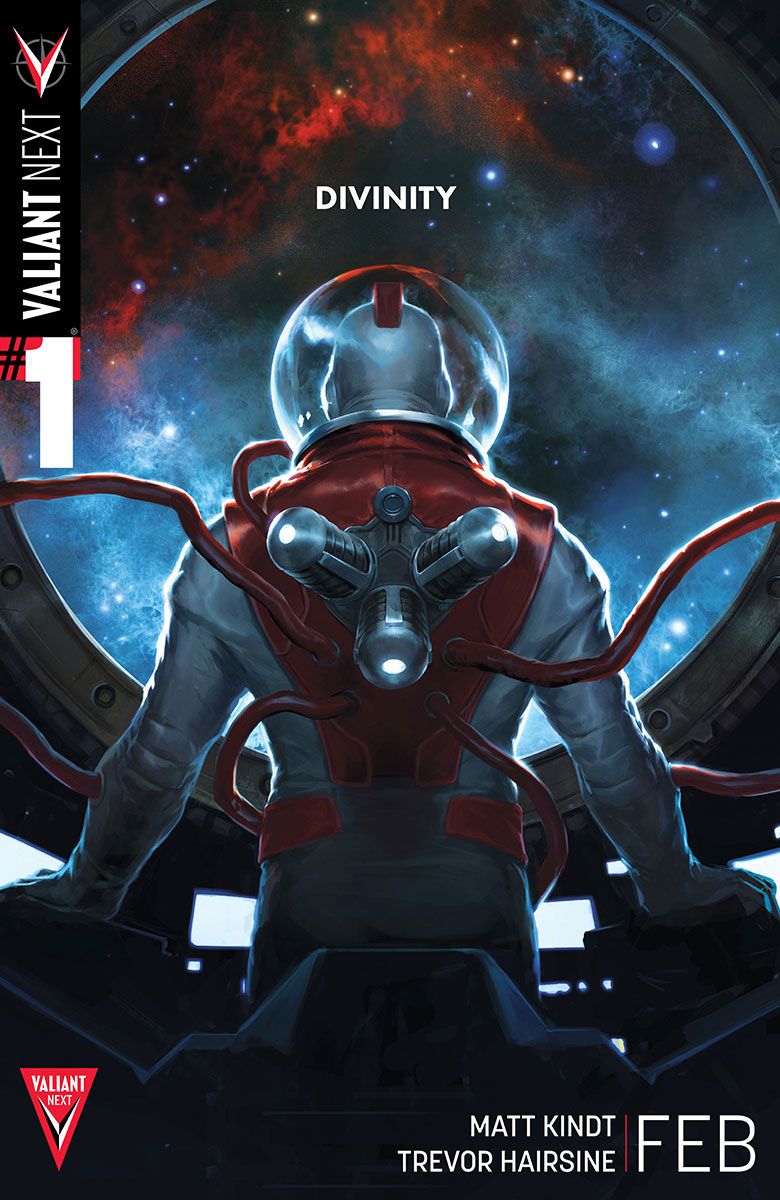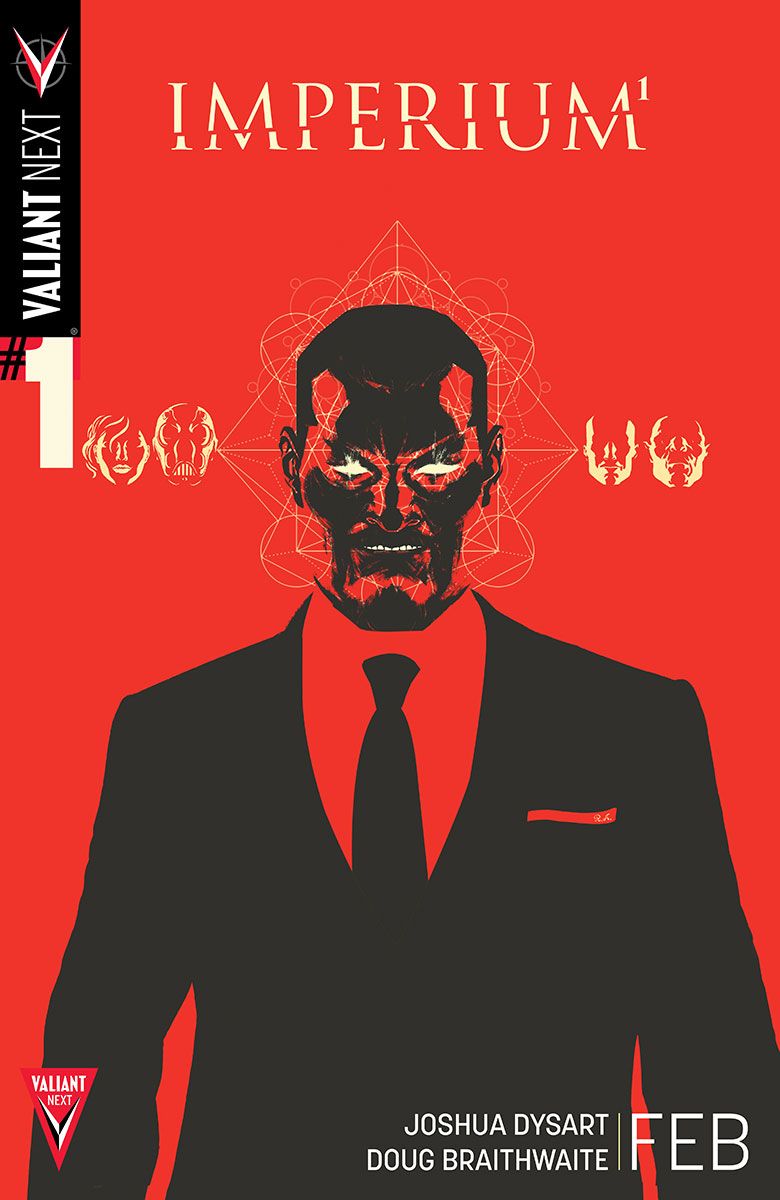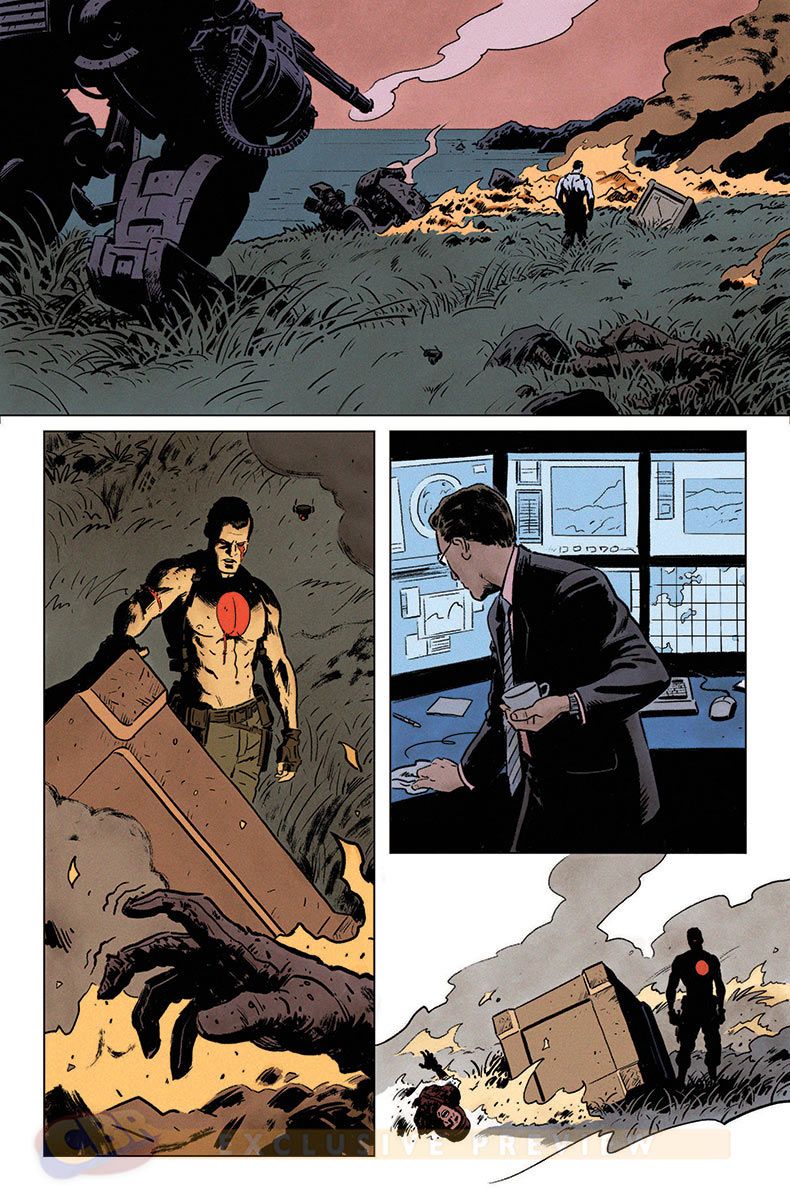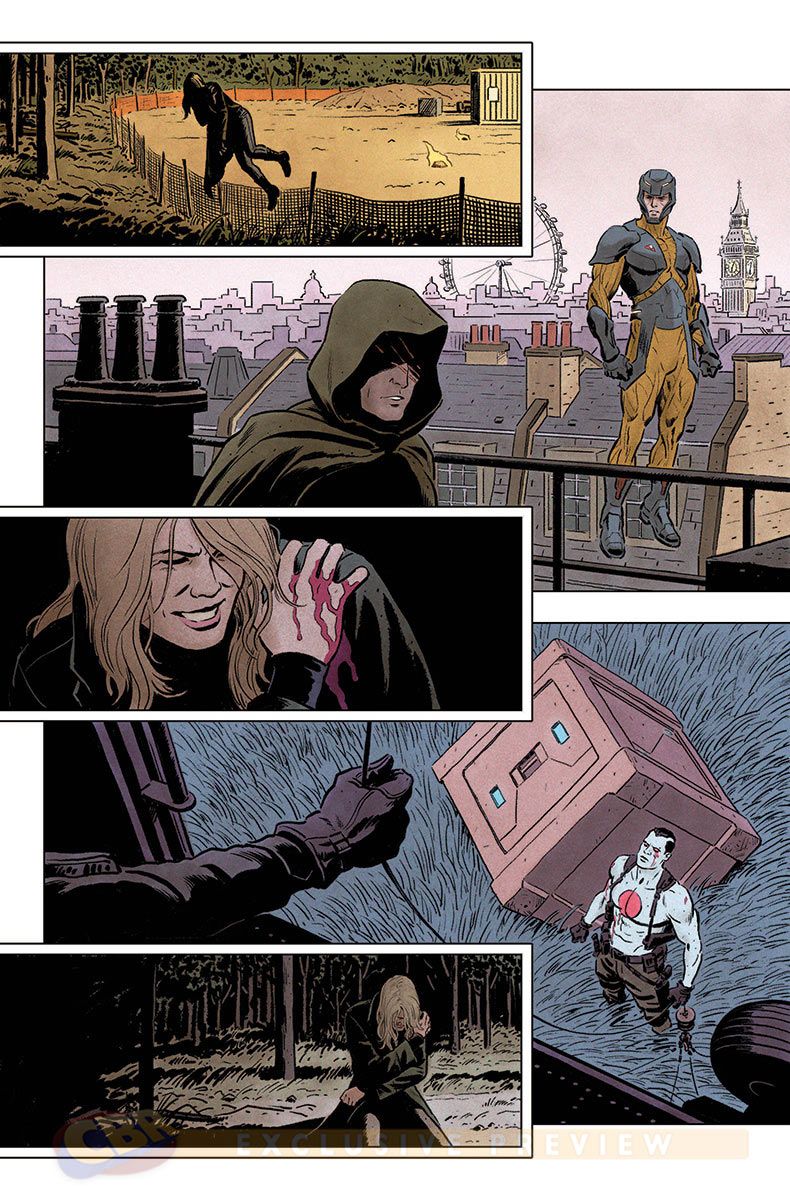Valiant Entertainment's publishing line has undergone a lot of change since it launched with "X-O Manowar" in 2012, and while publishing initiatives have come and gone during the two-and-a-half years of the company's existence, none were poised to make a bigger splash than Valiant Next, which introduces five new titles to the company's lineup between December 2014 and April 2015.
"Valiant Next" includes several new series concepts, including "The Valiant," a miniseries by Jeff Lemire, Matt Kindt and Paolo Rivera; "Imperium," by Joshua Dysart and Doug Braithwaite; and "Divinity," a four-issue miniseries by Matt Kindt and Trevor Hairsine -- as well as the long-awaited launch of a "Ninjak" ongoing by Matt Kindt and Clay Mann; "Ivar, Timewalker" by Fred Van Lente and Clayton Henry; and a new evolution for one of Valiant's launch characters in "Bloodshot Reborn" by Jeff Lemire and Mico Suayan.
RELATED: Asmus & Lieber Proclaim "Quantum and Woody Must Die!"
As we approach the next era for Valiant, CBR News spoke with CEO & Chief Creative Officer Dinesh Shamdasani, Editor-in-Chief Warren Simons and Publisher Fred Pierce about "Valiant Next." In addition to looking at how recent projects like the "Armor Hunters" event series will continue to affect the overall story of the Valiant Universe, we talk about the importance of timing when introducing new concepts and series, and why some of the company's launch titles -- like "Harbinger" and "Archer & Armstrong" -- are currently on the back-burner.
CBR News: Gentlemen, Valiant has made quite a few changes in the last year, not the least of which is its latest publishing initiative "Valiant Next." This is your third big publishing initiative following the debut of Valiant in 2012 and the Summer of Valiant in 2013, both of which launched books based on previous titles. "Valiant Next" is a a bit different, composed of a mix of throwbacks and brand new material. How important is that combination of nostalgia and new as the line moves forward?
Fred Pierce: What we were really trying to do at the beginning of the company was make sure that people who didn't really read Valiant in the past were comfortable with Valiant. The original plan was that 80 percent of readers were new for this iteration. It really isn't nostalgia, it's just time for us to bring some of the titles that we've been waiting to bring -- like a Ninjak title and a Timewalker title -- to what the new iteration is. When you read "Ninjak," you don't have to know there was a "Ninjak" in the past, but those who knew him in the past will be happy. So, it's not really nostalgia. In our industry, nostalgia isn't what propels people forward to read your books.
Dinesh Shamdasani: Fred's right, it's timing. Timing is key for us. We're very excited because we've been very patient. When you have characters with the potential of X-O Manowar and Harbinger and Bloodshot, you want to lead with those. When you have a universe that's as well built as the Valiant Universe is, you want to build the foundations up again. It's been difficult for us to wait, but we're very happy that we're finally here, where we have the building blocks set in stone for the foundation of the universe; we have the characters' origins and mythologies onboard now, and we can start to play with the toys we have and expand. You see that in books like "Divinity," which is crazy. It's unlike anything the Valiant Universe has seen before, I daresay it's unlike anything in comics. With "Imperium," Warren and Josh Dysart and Doug Braithwaite are exploring a bunch of cool ideas with a bunch of cool new characters.
Warren Simons: We have six new launches, and I'm excited about all of them. With "The Valiant," we have sequential interiors from Paolo Rivera co-written by Jeff Lemire and Matt Kindt, and it really kicks off and leads into what Jeff's "Bloodshot Reborn" book will be when he launches that with Mico Suayan. I feel like each of these books are extremely unique. I'm very psyched to have Fred Van Lente and Clayton Henry launching the "Timewalker" book for us. That first arc of "Archer & Armstrong" they did for us is one of my favorite things that I've ever had the opportunity to edit. I think Matt Kindt has come up with an absolutely brilliant sci-fi arc in "Divinity." Josh Dysart is doing extraordinary work with "Imperium."
We've probably had more requests for "Ninjak" than any other character, but as Dinesh mentioned, it's about putting things on the schedule when they're ready, and not expanding too quickly so that we're selectively putting the books out when they're ready. That's really important.
Shamdasani: It's served us well. It's one of those things that I think we've done very well: we know who we are, we know what we're capable of, and we don't want to compromise the core and integrity of the books that we're publishing. We don't overreach, we don't bite off more than we can chew. When we take our time -- and luckily, we have the resources to take our time, we know we're going to be here for 10 years -- and we'll get there eventually.
Launching "Valiant Next" is "The Valiant," which seems to set the stage for quite a bit of what will happen in the Valiant Universe in the following months. There have been hints of its importance to the line as a whole, but why exactly was it chosen as the anchor for "Valiant Next"?
Simons: On one hand, we have an incredibly compelling creative team. I had the opportunity to sit down with Matt and Jeff, and we were talking about different opportunities and different projects and what we wanted this thing to be. In a very organic manner, it took the scope of something that really touched on many different areas of the Valiant Universe. It touched on one of our key characters, Bloodshot, and his relationship to Kay McHenry, the Geomancer and also the Eternal Warrior, who's been a part of the Valiant Universe for 10,000 years. He's seen it all, he's done it all, and what we discover is something that returns from the past that needs to be stopped. If it's not, it'll usher in a new dark age for the Valiant Universe. The stakes are extremely high.
It's extremely gorgeous. Paolo Rivera needs no introduction; he's certainly one of the finest artists working in the medium today. The guys have this epic, beautiful story that we're really excited about. We feel like it's an entry point for new readers, and it's a great introduction to our characters and what the universe is.
Shamdasani: It's an epic canvas they're painting on. It's a lot of fun.
How much were projects like "Unity" and "Armor Hunters," Valiant's first-ever event series, testing the waters in terms of being able to successfully launch new original content?
Shamdasani: Warren said something very smart on the first day: "Best idea wins." It's really how we approach everything. We have a lot of great ideas from the original Valiant creators that built this thing: Jim Shooter, Bob Layton, Barry Windsor-Smith -- we take a look at those ideas, and if someone has a better idea, we go with that. If someone has an idea to expand on those ideas, we go with that. "Armor Hunters" came out of that. "Divinity" came out of a conversation Matt and Warren had. "The Valiant" came out of a conversation between Matt and Jeff -- we're happy to allow them to tell their stories in this universe.
That's one of the things that Valiant can do that other universes can't -- because we have this very cemented future version in 4001 with Rai and Eternal Warrior. We have the immortals that cross through time so we can see the ramification of events. It's a unique storytelling component.
Simons: We've been limiting the number of titles we're publishing so we're not putting out seventeen books at once. I feel like "Divinity" and "Imperium" are both great titles, and I'm extremely excited to be working on both. The guys have come up with extraordinary ideas. Also, as Dinesh just touched on, we're blessed by a deep bench. It took us three years to get to Ninjak because we had X-O, because we had "Armor Hunters," because we had "Harbinger." We're cycling and making sure we give everything its moment in the sun, as it were, but we don't want to rush this stuff out simply because it's a character in our library. We want to make sure the story's right, the creative team is right, the concept is right and we feel like that gives it the best chance.
Pierce: There's so much on the table. The beauty of it is that we're going to go with these ideas now, knowing that there are these other ideas in reserve, and can still be worked on behind the scenes. That's how you see something like Valiant Next develop. Right after Valiant Next, the idea is that whatever the creative teams are working on now will be brought to the fore. Because Valiant Next is up and running, we can be prepared for what comes after.
Shamdasani: It's just a different approach to what I think people are used to. We don't have corporate parents that dictate certain quarterly earnings. We don't have to put something out [immediately]. We can put something out when we're proud of it. We don't have to feed a movie schedule or a licensing schedule. We don't have to get certain characters out unless we find we have a story worth telling. Because of that, we've developed a very passionate, loyal fanbase. As Warren said, we try to make it manageable to buy everything -- because when you're reading one or two of the Valiant books, in a couple months, you're reading all the Valiant books. They're just great books that have the characters crossing over, and you get a larger tapestry unfolding in front of you.
We're really building a universe like no one has in a long, long time and we've done it successfully to this point. It's given us this ability to now do things no one has done in a long time: add new characters and build this larger mythology. It's a lot of fun.
Pierce: There's different pieces of the kaleidoscope. What makes it look good today and what makes it look good tomorrow as it spins [can be different]. It's great to have the old stuff with titles that people were aware of. We launched titled that had a ring of something [old] to them, like "Unity," which was something different in the old Valiant Universe, but makes perfect sense in how it was used this time. Now we're coming up with completely new characters. If you think about the logic of that, it makes sense. We've been publishing for two and a half years. We just did "X-O" #30. You can't fit in everything you want to fit in, so you have to work in a methodical way like this.
Dinesh, you mentioned that you see Valiant being around for the next ten years, at least. How far ahead are you actually looking?
Shamdasani: It's not an easy question to answer, honestly. The answer's not simple. We're looking 10 years ahead as to what kind of company we want to be. How do we want to get the characters out there? Do we know what we're publishing in 2024? No way. We have a sense of what books are coming out in a couple years, and those change.
Pierce: I do know what book we're publishing in summer 2024. I haven't told you yet.
Shamdasni: It's the new Valiant character Kaleidoscope. You heard it here first!
You'd be surprised, though. If you took a look at what Valiant Next looked like a year ago and what it was when it was released, they're very different. Some of those pieces got moved around, some of them got amalgamated, some got pushed back -- everything evolved to a better state. It's fun for us because we've moved faster and had more success than we anticipated. That's given us opportunities. Right before Valiant Next, you saw us do a lot of things that were very, very risky -- a lot of stories that you wouldn't normally see a publisher like us take a stab at, and that's because we've had so much success with the launch of the universe and the success of the next year and a half. We haven't really had any failures. None of the books we've put out haven't really worked -- they've all been critical successes and commercial successes.
We were just talking about "Rai." The numbers on "Rai" are fantastic. It's gone to five printings, we've done a dollar debut and the dollar debut sold out. We've got backorders in the hundreds of copies, and we're talking about whether we want to go to a second print on our dollar book. The retail community is saying they think it's a book that could be doing even better than it's doing, so we want to get this material out there so we can hook new readers. The trade numbers have just come in and they're phenomenal, some of the best we've ever had. The #1 issue continues to sell, which is evidence people are continuing to jump on the book.
We see these opportunities unfolding in front of us and we want to take advantage of them. As Warren said, we want to do it in a slow and steady wins the race manner.
Simons: We want to have a very controlled publishing plan as well. The story on the editorial side is leading to the next story, but it's also accessible. The story that Rob [Venditti] started in "X-O" led to "Armor Hunters." What we have coming up in a couple of months will be directly out of that. But these are entry points that are completely accessible to new readers. I feel like "Armor Hunters" is a story that you can hand to a new reader and they won't be pointed into chaos. They'll know who the characters are. If they read all 30 issues of "X-O," that would also be the case. I feel like we have a very, very precise publishing plan that we take a look at and try to adhere to. Obviously, stuff drops in, stuff drops out and new stuff is added as the stories lead to where they go organically. That's really want we're focusing on: telling tight, clean, accessible stories and providing clean entry points to readers.
Shamdasani: One of the things that Warren and Rob has done that's got me really excited is something we haven't been able to talk about -- everything thinks "Armor Hunters" is over, it's done. We did the four issues and everyone feels like it's done, and we've gotten a lot of kudos for the consequences that story has had on the universe. It's so cool because nobody knows what's coming next and the major consequence hasn't been revealed. They teased it in "Armor Hunters" #4.
Simons: I don't know how much we want to reveal right now, but what I will say is that the story was influenced by the nuclear arms race in the '80s. That'll be very influential as to where "X-O" goes next. It's not a story about nuclear war, it's not a story about geopolitics or anything along those lines, but there's a concept that we all fell in love with when we were talking about it and applied it to this grand space opera. It's going to be fun, and this is what Robert Venditti has done really well on "X-O" -- consistently changing the status quo of the character. On the editorial side, it's one of the hardest things to do, to constantly make it compelling, but he's done a really masterful job.
The stuff coming next is going to be the really beastly consequence of "Armor Hunters."
Shamdasani: It starts in "X-O Manowar" #34, so people know what to look for. When we reveal what it is, and if they've never read "Armor Hunters" or "X-O," they'll go, "Oh, that's bread and butter comics, a big fight thing, I can get excited about it." If you've read "Armor Hunters," you're going to be even more excited. "It's bread and butter comics, but oh my God, it came out of this!" We're teasing it in the book starting with the "Armorines" arc in issue #30.
In terms of new concepts in "Valiant Next," there's Matt Kindt & Trevor Hairsine's "Divinity" and Joshua Dysart and Doug Braithwaite's "Imperium" (with "Divinity" being a miniseries). How do these new series relate to some of the other work that the creative teams have done for Valiant before?
Warren: "Imperium" is an actual consequence of the events we saw in "Harbinger." What we saw at the end of "Harbinger" is that Harada actually got "outed" as a supervillain. Harada's always been a guy that's a kingmaker, content to operate from behind the scenes. He was the guy who moved markets, who decided how to slowly and carefully influence the shape of humanity -- which is a very difficult thing for any individual to do. As a consequence of the end of "Harbinger," Project Rising Spirit's servers actually got hacked, and there were hundreds of thousands of pieces of information that became public -- and one piece of informations was that they'd been monitoring Harada for 30 years, and it was a lot of what Harada was trying to do behind the scenes. The Harbinger kids, Peter Stanchek, Kris Hathaway, the whole team thought they were doing a great thing by making Harada a public figure, but this is actually the worst possible thing they could have done.
The thin veneer of professionalism and the idea that he was trying to maintain a public face at the head of this corporation stabilized him and gave him a goal, so he's become unhinged. What he's going to do is tap into some of the darkest corners of the Valiant Universe and build -- for lack of a better term -- a league of villains. He's going to reach out to four or five individuals he didn't reach out to before because he knew they were too dangerous or too powerful. But he doesn't need to hide it anymore. He's exposed and everyone's coming after him. He needs raw firepower to impart his vision on the face of humanity.
Josh's script is brilliant. He's created an artificial intelligence robot who's beholden to Harada. I really can't wait for it. It's a natural consequence of -- we knew when "Harbinger" was winding down where we planned to go with the book, but it feels like this is a great place for "Harbinger" fans to come to in February, to see where one of the most compelling antiheroes in comics is going to take the stage.
Bloodshot is a character that's gone through some significant changes since his standalone title launched in 2012.
Simons: Wait until you get to April! Wait until you see what Lemire has planned for this, because it's quite extraordinary. It's unlike any book that I've worked on before -- I'll put it to you that way.
Shamdasani: We really can't say that much about it because "The Valiant" is such an important piece to it. It gives it the momentum that you'll see in "Bloodshot Reborn." Every page, every story beat is a spoiler, but it's such a different book that keeps in the mythology that it's a hard book to tell people about.
While there are many familiar creators on the list for "Valiant Next," and certainly there are old favorite books coming back under new life like "Quantum and Woody Must Die," there's not much information out there about some of the other popular books that have closed out their first volumes, like "Harbinger" or "Archer & Armstrong." Should fans be reading anything into the fact that they're not a part of the "Valiant Next" lineup?
Simons: Those are two of my favorite books; Peter Stanchek and Kris Hathaway are two of my favorite characters. I think, as I mentioned earlier, "Archer & Armstrong" is one of my favorite stories I've ever worked on as an editor. I promise you that they're near and dear to our hearts up here, and we have grand plans for them. I don't know how much we want to get into it here, but we love those characters dearly. We want to continue to do things that will shake things up. We don't want to -- as Fred said a little bit earlier -- we want to put out new books as well. We're really excited about "Divinity," we're really excited about "Imperium," we're really excited about what we're coming up for "Harbinger," we're really excited about what we have coming up for "Archer & Armstrong." But we're a young company and we want to make sure we're putting this stuff out when it's ready and it's right, and we're not forcing it to move past a certain amount of titles per month.
Pierce: We have just so many slots available in a month, and I think within a year fans will start to see us start to move again more toward what you're talking about.
Simons: "Kaleidoscope" is up next! [Laughs]
Shamdasani: They're big characters and we love them. They're definitely coming back in a big way. The fans are going to have to be patient with us until we get there. When we launched "Archer & Armstrong," I'll never forget, the message we were getting from the fans was that we could not do the book unless Barry Windsor-Smith was on it. No matter what pieces we put out there, the fans said we were getting it wrong. I looked today and there's a campaign for Fred Van Lente and Clayton Henry to do that book until the end of time. They've been very excited about "Ivar, Timewalker." We've seen Ivar from Fred and Clayton already in "Archer & Armstrong."
I wouldn't be surprised if a year from now, two years from now, we're sitting here and there's a campaign for Fred and Clayton to write "Ivar, Timewalker" until the end of time. We have the benefit of being able to see what's coming down the road. We know how exciting this stuff is.
Simons: Archer and Armstrong are in "The Valiant." It's not like these guys are disappearing from the tapestry of the universe. They're all here and we're going to keep checking back in on them. I've had many conversations about creators about what's coming up next and we're very excited. But we're just trying to put out the best books possible one at a time. Be patient -- a lot of great stuff is coming down the line.
It's really a testament to Valiant that when we threw out "Divinity" and "Imperium," they weren't like, "Let's do 'Harbinger.'" They wanted to swing for the fences. Let's take a crazy Communist God and put him into our universe and see how it plays in "Divinity." Let's do "Imperium," where Harada's going to be surrounded by characters we've never seen before. How is the universe going to respond to that? How is it going to respond when he's walking around with five nuclear bombs all the time?
Shamdasani: Everyone here would rather swing for the fences and fail than play it safe. Because we're a start-up, we have to have that nature. I think people gravitate toward us that have that nature. That's what you see in everything we do, like "Doctor Mirage," which is a crazy idea, but look at the response it's had. We were talking about "Divinity" up until the day it was announced. "Is that the right thing to say, is it too far? Is it too crazy?"
Simons: It's nice when you have a writer that's the caliber of Matt Kindt who's going to come up with some absolutely insane, beautiful idea, and to throw an artist like Trevor Hairsine on it and see what happens. Trev's a master storyteller doing masterful work. It's great, exciting comics. We're excited for it.
One of the aspects at the forefront for publishers are digital initiatives. How important is digital to Valiant moving into 2015.
Pierce: We've been very successful digitally. We've recently opened up -- instead of being exclusive with one company, we've opened up to a lot of different companies. Digitally, we were very successful with Humble Bundle. Digital is very important. One of the great things about Digital is that anyone who isn't near a comic book store is one click away from our books. Digital serves a tremendous function for us, however, we're still focused on the comic book stores.
When you sell things digitally, it's a quiet sale. When you sell things in the stores, it's an added sale. Someone walks into a store and buys a Valiant comic or is convinced by a sales associate excited by a Valiant comic to buy it. You don't have that digitally. I feel they're already pre-sold. You can search through the list. But when someone walks into a comic book store and someone's excited, they'll say, "You have to try this." You can do that in a comic book store.
As wonderful as digital is, and as much as people have been talking about digital for years, comic book stores are still the backbone of our industry. If you look into comic book stores, you're bringing a whole new clientele. Digital pushes to the comic book stores, comic book stores push to digital. I think that's something that will be wonderful. Digital has replaced the newsstand.
Shamdasani: Digital's great for sampling. Digital is very important to us. It gets people to jump onto something quickly. We have a lot of international fans, who aren't near a store. This is interesting -- we saw this in "Armor Hunters": we had a really big spike in "Armor Hunters" #4 the minute it was released on digital and we didn't see any loss in sales on the print side. We think people are jumping onto digital because they can't wait to see the end of our story. We get that a lot at the end of arcs. Then, they go into a store and buy it because they liked it so much, they have to have it.
We do a lot of things in the books themselves that is print only. There's editorial content, there's previews, there's backmatter -- the deluxe editions have been huge for us. We're all comics fans in the office, so we want to make it the best we can. We're all invested in the different iterations of the comics and we want to be proud of them.
As Valiant looks forward to 2015, what are some of the main goals of the line? Can we expect to see another Summer of Valiant for the third year running? What's the main priority in terms of content?
Shamdasani: Keep telling great stories.
Simons: I want to be the number one comic publisher in the industry by the end of 2015!
I think Dinesh summed it up pretty well. We're consistently trying to tell great stories with great creators that are accessible. I feel very lucky to be working in a universe that had such an extraordinary history when we walked in here three years ago -- iconic comic creators like Jim Shooter and Barry Windsor-Smith helping to build this stuff. Moving forward, we're going to continue telling great stories with these amazing characters and continue to put out what I feel pound for pound are the best books in the industry.
Shamdasani: I bet the reaction you get from other publishers when you ask this question is, "We've got this book coming up, we've got this stuff, we want to get this movie off the ground, we want this toy deal." It's difficult for us to answer that because we don't want any of those things. We know we're going to publish about a hundred monthly comics next year. All we want to do is make 100 great comic books next year that we can stand behind and say they were the best they could be. Life's too short to make a bad comic. We're not interested in chasing Hollywood, we're not interested in chasing licensing deals -- that stuff's coming, and it's really nice, but we all believe that if you do great comics, that stuff comes, but it's not something we built the company to attack. It's coming organically.
We just want to make 100 or so damn good comics. If we can make 100 of the best comics that come out next year, we're happy. Mission accomplished.

